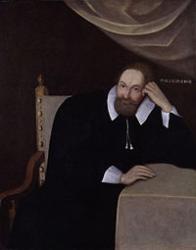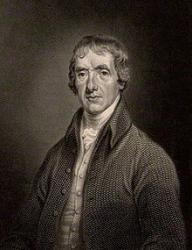Planning worship?
Check out our sister site, ZeteoSearch.org,
for 20+ additional resources related to your search.
- |
User Links
Person Results
‹ Return to hymnal


Export as CSV
T. Humphries
Hymnal Number: 395 Author of "O thou, from whom all goodness flows" in A Collection of Psalms and Hymns for Christian Worship. 16th ed.
T. Humphries
Thomas Jervis
1748 - 1833 Person Name: Jervis Hymnal Number: 20 Author of "With sacred joy we lift our eyes" in A Collection of Psalms and Hymns for Christian Worship. 16th ed. Jervis, Thomas, son of a Presbyterian Minister of the same name, was born at Ipswich in 1748, and educated for the Ministry at Hoxton. In 1770 he was appointed classical and mathematical tutor at the Exeter Academy. From 1772 to 1783 he was tutor to the sons of the Earl of Shelburne, at Bowood, where Dr. Priestley was librarian. In the latter year Jervis succeeded Dr. A. Rees at St. Thomas's Southwark, moving in 1796, after the death of Dr. Kippis, to the Princes' St. Chapel, Westminster. From 1808 to 1818 he was minister at the Mill Hill Chapel, Leeds. After his retirement he lived in the neighbourhood of London, and died there in 1833. Jervis was one of the four editors of A Collection of Hymns & Psalms for Public & Private Worship, London, 1795. He contributed 17 hymns to the 1st ed., and 4 to its Supplement, 1807. Of these several are found in later Unitarian collections in Great Britain and America, including:—
1. God to correct a guilty world. Divine Providence.
2. Great God, Thine attributes divine. Confidence in God.
3. Lord of the world's majestic frame. Praise a Duty.
4. Shall I forsake that heavenly Friend? Constancy desired.
5. Sweet is the friendly voice which [that] speaks. Peace to the Penitent.
6. Thou, Lord, in mercy wilt regard. Penitence.
7. With sacred joy we lift our eyes. Divine Worship. This is given in Laudes Domini, N.Y., 1884, as: "With joy we lift our eyes."
These hymns all date from 1795, and the most popular are Nos. 4 and 6. [Rev. Valentine D. Davis, B.A.]
--John Julian, Dictionary of Hymnology (1907)
Thomas Jervis
John Ogilvie
1732 - 1813 Person Name: Ogilvie Hymnal Number: 71 Author of "Begin, my soul, the exalted lay" in A Collection of Psalms and Hymns for Christian Worship. 16th ed. John Ogilvie was born in 1733, and was minister of Midmar, Aberdeenshire, Scotland, from 1759 until his death in 1814. He published some theological and philosophical treatises, and a number of poems.
--Annotations of the Hymnal, Charles Hutchins, M.A. 1872.
=============
Ogilvie, John, D.D., eldest son of the Rev. James Ogilvie, or Ogilvy, of Aberdeen, was born at Aberdeen in 1733. After studying at the University of Aberdeen (Marischal College), which, in 1766, conferred upon him the degree of D.D., he became parish minister of Lumphanan, Aberdeenshire, in 1759, and of Midmar, Aberdeenshire, in 1760. He died at Midmar, Nov. 17, 1813. He published a number of poetical works, and among others Poems on Several Subjects, in 2 vols. (London, 1769). This includes his well known paraphrase of Psalm cxlviii.— "Begin, my soul, the exalted lay." He was a member of the Committee appointed by the General Assembly of 1775, to revise the Scottish Translations and Paraphrases of 1745, and is said to have contributed No. 62, “Lo, in the last of days behold", to the 1781 authorized ed. of the same. [Scottish Translations and Paraphraphs] [Rev. James Mearns, M.A.]
--John Julian, Dictionary of Hymnology (1907)
=================
Ogilvie, John, p. 856, ii. From his psalm version, "Begin, my soul, the exalted lay," the cento “Ye fields of light, celestial plains" is taken.
--John Julian, Dictionary of Hymnology, Appendix, Part II (1907)
John Ogilvie
Thomas Scott
1705 - 1775 Person Name: Scott Hymnal Number: 195 Author of "Imposture shrinks from light" in A Collection of Psalms and Hymns for Christian Worship. 16th ed. Thomas Scott was born at Norwich, and was the son of a Dissenting minister. After his education he began his ministerial life at Wartmell, in Norfolk, adding also the labours of school-teaching. Subsequently he changed his pastoral relations several times, spending the last years of his life at Hupton, in Norfolk, where he died in 1776. He was the author of some prose works, several poems, and a few hymns.
--Annotations of the Hymnal, Charles Hutchins, M.A., 1872
============================
Scott, Thomas, son of Thomas Scott, Independent Minister at Norwich, brother of Elizabeth Scott, and nephew of Dr. Daniel Scott, was born at Norwich, 1705. As a young man he kept a school at Wortwell, and preached once a month at Harleston, Norfolk. Then, after a short ministry at Lowestoft, he removed in 1734 to Ipswich as co-pastor with Mr. Baxter of the Presbyterian congregation meeting in St. Nicholas Street Chapel. On the death of his senior in 1740 he became sole pastor. In 1774 he retired to Hapton, and died there in 1775. He was the author of various poetical works, including:— (1) The Table of Cebes; or, the Picture of Human Life, in English Verse, with Notes, 1754; (2) The Book of Job, in English Verse; translated from the original Hebrew, with Remarks, Historical, Critical, and Explanatory, 1771; 2nd ed. 1773; (3) Lyric Poems, Devotional and Moral. By Thomas Scott, London, James Buckland, 1773.
To Dr. Enfield's Hymns for Public Worship, Warrington, 1772, he contributed "All-knowing God, 'tis Thine to know" (p. 43, ii.); "Angels! roll the rock away" (p. 69, i.); "As various as the moon " (p. 85, ii.); and the following:—
1. Absurd and vain attempt to bind. Persecution.
2. Behold a wretch in woe. Mercy.
3. Imposture shrinks from light. Private Judgment, its Rights and Duties.
4. Mark, when tempestuous winds arise. Meekness.
5. O come all ye sons of Adam and raise. Universal Praise to God.
6. Th' uplifted eye and bended knee. Devotion vain without Virtue.
7. Was pride,alas, e'er made for man? Humility.
8. Why do I thus perplex? Worldly Anxiety reproved.
In his Preface to his Lyric Poems, 1773, he said that the object of his work was:—
"To form a kind of little poetical system of piety and morals. The work opens with natural religion. Thence it proceeds to the mission of Jesus Christ, his sufferings, his exaltation, and the propagation of his doctrine. Next is the call to repentance, the nature and blessedness of a Christian life, and the entrance into it. These topics are succeeded by the various branches of devotion: after which are ranked the moral duties, personal and social, the happy end of a sincere Christian, and the coming of Jesus Christ to finish his mediatorial kingdom by the general judgment. The whole is closed with a description of the illustrious times, when by means of the everlasting gospel, the earth shall be full of the knowledge of the Lord as the waters cover the sea."
Of Scott's better known hymns this volume contained most of those named above, and:—
9. Hasten, sinner, to be wise. p. 493, ii.
10. Who, gracious Father, can complain? The Divine Dispensation
In the Collection of Hymns and Psalms, &c, 1795, by Kippis, Rees, and others, several of the above were repeated, and the following were new:—
11. If high or low our station be. Justice.
12. Happy the meek whose gentle breast. Meekness.
Doctrinally Scott might be described as an evangelical Arian. Hymns of his appear in most of the old Presbyterian collections at the close of the last century, and in the early Unitarian collections. Several are still in common use in G. Britain and America. [Rev. Valentine D. Davis, B.A.]
-- John Julian, Dictionary of Hymnology (1907)
Thomas Scott
John Bickersteth
1781 - 1855 Person Name: Bickersteth Hymnal Number: 609 Author of "Israel's Shepherd, guide me, feed me" in A Collection of Psalms and Hymns for Christian Worship. 16th ed. Bickersteth, John, M.A., son of Henry Bickersteth, surgeon, born at Kirkby-Lonsdale, June, 19, 1781, and educated at the Grammar School of that town, and Trinity College, Cambridge, where he graduated in honours. Taking Holy Orders, he became Vicar of Acton, Suffolk, and subsequently Rector of Sapcote, Leicestershire. He died Oct. 2, 1855. The Dean of Lichfield is his second, and the late Bishop of Ripon his fourth son. In 1819 he published Psalms and Hymns, selected and revised for Public, Social, Family, or Secret Devotion, in which his hymns were included. A fourth edition, much enlarged, appeared in 1832. Of his hymns contributed to his Collection in 1819, the following were transferred to his brother's Christian Psalmody, 1833:—
1. Great God, let children to Thy throne. S. Schools.
2. Hast Thou, holy Lord, Redeemer. H. Communion.
3. Israel's Shepherd, guide me, feed me. H. Communion.
and were thus brought into wider notice than through his own work. No. 3 is sometimes given as "Heavenly Shepherd, guide us, feed us," as in the American Unitarian Hymns of the Spirit, Boston, 1864.
-- John Julian, Dictionary of Hymnology (1907)
John Bickersteth
Sir Henry Wotton

1568 - 1639 Hymnal Number: 289 Author of "How happy is he born or taught" in A Collection of Psalms and Hymns for Christian Worship. 16th ed. Wotton, Sir Henry, M.A., born in Kent in 1568, and educated at New and at Queen's Colleges, Oxford. After spending nine years on the Continent, on his return he became secretary to Robert, Earl of Essex, with whom he continued until Essex was committed for high treason, when he retired to Florence. There he became known to the Grand Duke of Tuscany, and was sent by him, in the name of "Octavio Baldi," with letters to James VI., King of Scotland, in which the king was informed of a design against his life. On succeeding to the English throne James knighted Wotton and sent him as ambassador to the Republic of Venice. In 1623 he was made Provost of Eton (having previously taken Deacon's Orders). He died in 1639. His works include The Elements of Architecture, Parallel between the Earl of Essex and the Duke of Buckingham, Essay on Education, &c. His poems and other matters found in his manuscripts were published posthumously by Izaak Walton in 1651, as Reliquiae Wottonianae. This has been several times reprinted
--John Julian, Dictionary of Hymnology (1907)
Sir Henry Wotton
Carter, Hendee & Co.
Publisher of "" in A Collection of Psalms and Hymns for Christian Worship. 16th ed.
Carter, Hendee & Co.
John Aikin

1747 - 1822 Person Name: Aikin Hymnal Number: 554 Author of "While sounds of war are heard around" in A Collection of Psalms and Hymns for Christian Worship. 16th ed. Aikin, John, M.D., 1747-1822. The brother of Mrs. Barbauld,son or Dr. Aikin of the Warrington Academy. As a physician he practised at Warrington and Yarmouth, and from 1798 till the time of his death lived at Stoke Newington. Author (with his sister), of Evenings at Home, editor of the General Biographical Dictionary, and for some time of the Monthly Magazine. His hymn In time of war, "While [what] sounds of war are heard around," was very popular. It is in Kippis and Martineau’s Hymns for the Christian Church and Home.
--John Julian, Dictionary of Hymnology (1907)
John Aikin


 My Starred Hymns
My Starred Hymns


